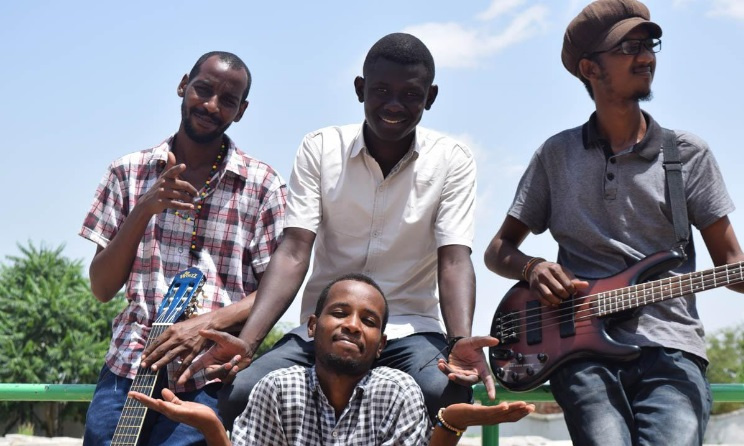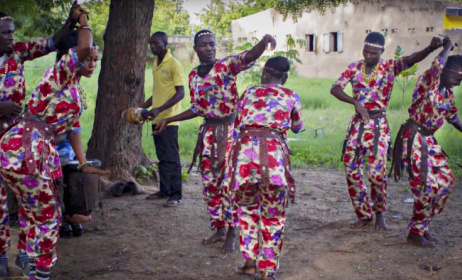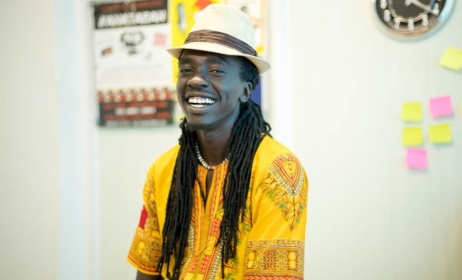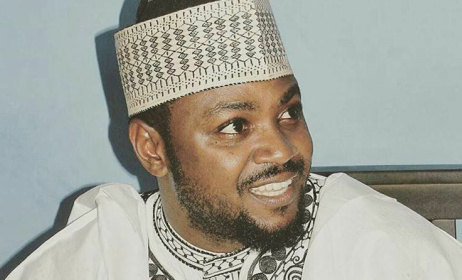MIAConnects artists on their way
The Music In Africa Foundation (MIAF) has announced that a number of mobility programme recipients have now embarked on tours in their counties. The programme, which is part of the multi-faceted Music In Africa Connects (MIAConnects) project, will ultimately see about 100 musicians and crew touring nationally. Additional plans are afoot to aid the musicians to tour outside their countries next year, the Foundation said.
 Sudanese band Nogara Project are among the recipients of the MIAConnects mobility programme.
Sudanese band Nogara Project are among the recipients of the MIAConnects mobility programme.
The programme is designed to support music professionals, arts centres, foundations and other music-industry professionals in African countries affected by conflict. Earlier this year, the Foundation advertised a call via the musicinafrica.net portal targeting artists based in Chad, Mali, Niger, Nigeria (North), Somalia, Sudan and South Sudan to apply for mobility support. A large number of musically diverse applicants who made their submissions and were approved to participate in the programme have now received their funds and some have already begun performing at the venues and events they identified.
So far, the recipients of the MIAConnects mobility programme for 2017 are:
- IBI (Northern Nigeria)
- Hasken Fortress Band (Northern Nigeria)
- Mistabooks (Northern Nigeria)
- LAH Scientist (Northern Nigeria)
- Doug Kazé (Northern Nigeria)
- DJ Yanky (South Sudan)
- SIISE (South Sudan)
- Street Beats Music Foundation (South Sudan)
- Yuppie Jay (South Sudan)
- Rammy Milz (South Sudan)
- Jazz Bizzy (South Sudan)
- Rocky J (South Sudan)
- BHA Organisation (Sudan)
- Nogara Project (Sudan)
- Adeca (Mali)
- Ben Zabo (Mali)
- Groupe Lolo (Mali)
- Filo la Diva (Niger)
- Kaf Lagaf (Niger)
“We’re happy that the first phase of the MIAConnects mobility programme is running smoothly,” MIAF project manager Carmel Nair said. “Many of the musicians who applied for the programme have already staged great shows in their countries with the support of the MIAConnects mobility programme. We look forward to seeing even more musicians getting the opportunity to travel and play more actively as MIAConnects continues into 2018.”
Nair said the next phase of the programme would see artists get the opportunity to travel beyond the borders of their countries to other regions on the continent. The MIAF is in in talks with various festivals whereby artists from the MIAConnects countries would be invited to perform on Africa’s biggest stages.
“We want to see our recipients gain exposure all over the continent and beyond. That’s why we’re in discussions with festival organisers in various African countries to explore the possibility of MIAConnects recipients to perform at these festivals as part of the MIAConnects mobility programme. A big concert or festival, where musicians can network with other musicians, label owners and event organisers from all over the world, can be the start of a successful music career.”
Nair said support for musicians in terms of mobility was not always an easy task. She said the Foundation had experienced a number of challenges to aid musicians in countries where basic infrastructure is lacking.
“Access to crisis-hit areas in Africa is difficult. Radical groups, uprisings, war and terror are hampering economic growth and destroying the livelihoods of millions of people. The localised banking services in some countries, for example, have made it very difficult to send money to beneficiaries. However, we’re confident that all the artists we selected will be on their way to performing in their countries soon,” she said.
MIAConnects, which has allocated about €35 000 ($41 000) towards phase one of its mobility drive, is supported by the German Federal Foreign Office and Siemens Stiftung. The project also includes other components that offer the music industries in conflict-hit countries a wider platform. One such component includes commissioning experts and academics to research topics about the music industries in the seven focus countries. The research will cover areas such as how conflict has affected the music sectors in the identified countries, the opportunities that exist for local music professionals, the efforts being made towards reigniting these music industries and the role music plays as a socio-economic catalyst, among others. The research will culminate in the publishing of approximately 70 articles on the Music In Africa portal (www.musicinafrica.net).
MIAConnects also aims to develop the skills of music professionals by holding training and upskilling workshops together with arts organisations operating on the ground in the seven countries. Four countries – Mali, Chad, Sudan and Somalia – have already implemented workshops focusing on music theory, marketing, production and stagecraft, with more training areas to be identified according to music professionals’ needs in each country next year.
“MIAConnects is manifold in that it seeks to discover new talent in Chad, Mali, Niger, northern Nigeria, Somalia, Sudan and South Sudan. We want to connect musicians from different countries by having them perform nationally, regionally and outside the African continent. We are positive that there will be many success stories to report in the course of 2018,” Nair said, adding that music fans have to play their part by attending performances and supporting the work of artists.





























Comments
Log in or register to post comments